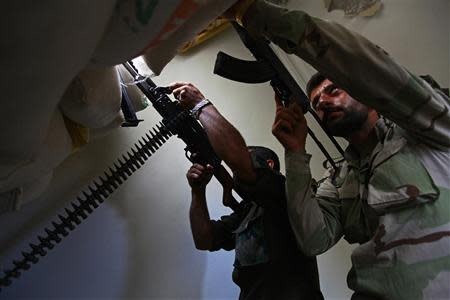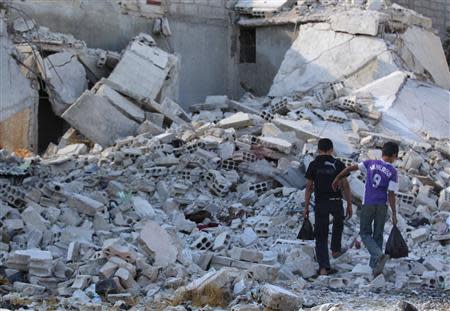France expects U.N. council to agree on Syria arms measure
By John Irish and Alexei Anishchuk UNITED NATIONS/SOCHI, Russia (Reuters) - France's foreign minister said on Monday he expects the U.N. Security Council to agree on a resolution to enforce the chemical weapons deal with Syria and appeared to back off French calls for the measure to threaten force against President Bashar al-Assad. Syria's civil war is a top agenda item as world leaders gather this week for the annual U.N. General Assembly. Envoys from the five big U.N. powers - the United States, Britain, France, Russia and China - have been meeting to negotiate a resolution to back the U.S.-Russian deal reached in Geneva this month to remove Syria's chemical weapons by June 2014. Some U.N. diplomats have expressed concern about whether agreement on a resolution is possible in the face of sharp ongoing differences on the Security Council. France has been out front in calling for Assad's government to face punitive measures if it fails to live up to the terms of the agreement, with an initial French draft Security Council resolution calling for issuing an ultimatum to Damascus to comply. But with Western powers giving up on what U.N. diplomats call a "trigger" clause for automatic punitive measures in the event of Syrian non-compliance, prospects for an agreement between Russia and the West on a draft resolution may be improving. U.N. diplomats told Reuters on condition of anonymity that all discussions on the draft resolution were on hold until a bilateral meeting on Tuesday between U.S. Secretary of State John Kerry and Russian Foreign Minister Sergei Lavrov at which Syria will be among the topics of discussion. Speaking to reporters in New York, French Foreign Minister Laurent Fabius appeared to confirm France's willingness to accept Russia's demand that the draft resolution not be enforceable under Chapter 7. According to the Geneva agreement, the Security Council would have to adopt a second resolution in order to punish Syria for any non-compliance with the U.S.-Russian plan to eradicate Syria's chemical arsenal. "We should take exactly what was foreseen in Geneva. On that basis we should come to an agreement," Fabius said. DEAL FOLLOWED U.S. THREAT The U.S.-Russian deal followed threats by U.S. President Barack Obama to carry out military strikes against Assad's forces in response to an August 21 chemical weapons attack on civilians near Damascus. The United States blames Assad's government and said the sarin gas used in it killed more than 1,400 people. Assad's government blames the rebels for that attack. Russia and China have blocked three U.N. resolutions meant to pressure Assad during Syria's civil war, raging since 2011. Russia accused the West on Sunday of trying to exploit the deal between Moscow and Washington to push through a council resolution issued under Chapter 7 of the U.N. charter, which could authorize sanctions or military intervention if the Syrian government reneges on its commitments. "For it to be acceptable to France ... the resolution should foresee that measures under Chapter 7 are taken if Syria does not comply with its commitments in line with the Geneva agreement," Fabius said. He added the resolution should also call for those behind the chemical attack to face justice. PUTIN'S WARNING Ahead of the General Assembly, Russian President Vladimir Putin issued a fresh warning of spillover from the Syrian civil war. In the Russian Black Sea resort city of Sochi, he told former Soviet allies that Islamist militancy fueling the war in Syria could reach their countries, some of which have Muslim majorities. Russia, which has a large Muslim minority of its own and is fighting an Islamist insurgency, has accused the West of helping militants by seeking Assad's removal without paying enough attention to the potential consequences. Putin told leaders of the six-nation Collective Security Treaty Organization (CSTO) that militants fighting Assad could eventually expand attacks beyond Syria and the Middle East. "The militant groups (in Syria) did not come out of nowhere, and they will not vanish into thin air," Putin said. "The problem of terrorism spilling from one country to another is absolutely real and could directly affect the interests of any one of our countries," he said, citing the deadly attack on a shopping mall in Nairobi as an example. Meanwhile, the leader of Lebanon-based Hezbollah, which has backed Assad in the civil war in neighboring Syria and has sent troops across the border to fight on the government's side, on Monday denied the group had received chemical weapons from Syria. Members of the Istanbul-based opposition Syrian National Coalition have accused Assad's government of transferring chemical weapons to Hezbollah to escape inspection. "This accusation is truly laughable," Hezbollah leader Sayyed Hassan Nasrallah said in a televised speech. "We understand the dimensions and background of these accusations, and these have dangerous consequences for Lebanon." In an interview with China's state television, CCTV, Assad criticized the United States for threatening to attack Syria, saying it was finding "excuses for war." The violence continued in Syria. A Libyan commander and a dozen other fighters from al Qaeda's Islamic State of Iraq and the Levant have been killed in clashes with rival rebel forces in northern Syria, a monitoring group said, in the latest spate of internecine rebel violence. (Reporting by Alexei Anishchuk in Sochi, Alexander Dziadosz and Dominic Evans in Beirut, Sui-Lee Wee in Beijing, Miral Fahmy in Singapore and Louis Charbonneau in New York; Writing by Will Dunham; Editing by Jim Loney)



